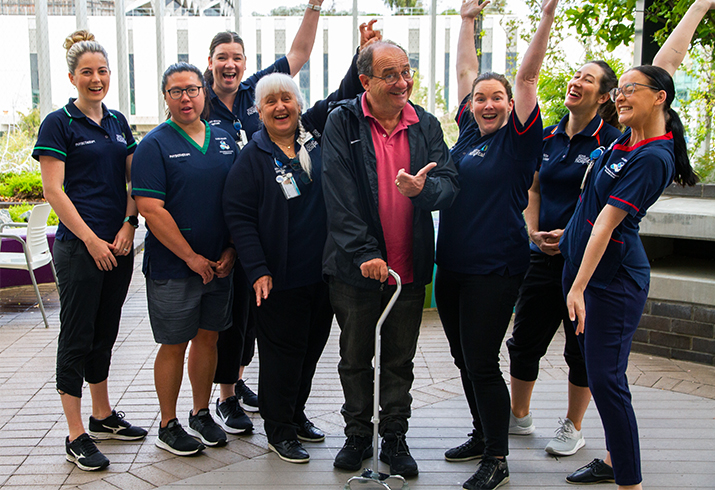Allied health professionals giving the gift of recovery
 Physiotherapist Kristen, Physiotherapist Winnie, Allied Health Assistant Emma, Allied Health Assistant Jennifer, Anthony Basile, Occupational Therapist Alexis, Speech Pathologist Amanda and Occupational Therapist Jessica.
Physiotherapist Kristen, Physiotherapist Winnie, Allied Health Assistant Emma, Allied Health Assistant Jennifer, Anthony Basile, Occupational Therapist Alexis, Speech Pathologist Amanda and Occupational Therapist Jessica.
Christmas should be an exciting and joyful time, but on a routine Monday morning in December 2020, life changed dramatically for 61-year-old Anthony ‘Tony’ Basile when he was rushed to the Fiona Stanley Hospital (FSH) emergency department (ED) after collapsing.
“Initially I had felt tingling in my fingers and weakness in my legs on the Sunday but as I got ready for work the next day, my leg completely collapsed on me, I actually thought I was having a stroke,” Tony said.
After being assessed by a neurologist in ED, Tony was diagnosed with Guillain-Barré syndrome (GBS) - a rare autoimmune condition where the body's immune system attacks the nerves connecting the brain and spinal cord with the rest of the body. It causes weakness, numbness or paralysis. There is no known cure and the road to recovery can be long.
“It was a bit of a shock as it just came out of the blue and I had never heard of the syndrome,” Tony said.
“I was really lucky because I got to the hospital quickly and by that night, I was given plasma and antibodies on the neurology ward which stopped it from spreading to my chest as it would have affected my breathing.”
Tony spent a week on the Acute Neurology ward at FSH and a further nine weeks at the State Rehabilitation Service (SRS) where he undertook a rigorous rehabilitation journey to help get him back to life as he knew it.
“Once I understood what having GBS meant, I realised this was going to be a long and hard journey,” Tony said.
“It was quite shattering because I’d gone from being a fully-functioning adult, to suddenly being in a wheelchair. I spent Christmas in hospital; one of my sons got married on 9 January 2021 which I was able to attend on the day, but it was a lot for us all to get our heads around.”
During his time at the SRS, Tony worked with many allied health professionals including physiotherapists (every day) and occupational therapists (every second day).
In February, he was discharged and continued to be assisted by the allied health team at South Metropolitan Health Service (SMHS) Rehabilitation in the Home (RiTH) until April 2021. From April 2021, Tony has been having weekly outpatient appointments at SRS.
Occupational Therapist Jessica Gatenby worked with Tony in the Acute Neurology ward when he was first diagnosed and supported him in understanding his GBS diagnosis and rehabilitation trajectory.
Jessica said one of the key parts of her role was to continue to remind Tony of his identity and help him remain focused on his goal of returning home.
“I am so proud of how far he has come and to see him walking is amazing,” Jessica said.
“Where Tony is today is an absolute credit to his resilience, determination and commitment to his recovery, he is a beautiful reminder of why we do what we do as occupational therapists.”
Tony has recently returned to full-time work as a lawyer and is feeling good about getting back to normality and enjoying the things he previously took for granted, like interacting with his colleagues.
He credits his successful recovery to the nurses, doctors and allied health professionals at FSH and RiTH, and also his family comprising his wife and four children – one of his sons is a physiotherapist and one of daughters is an occupational therapist. All have assisted in his recovery and kept him on track.
Tony was wheelchair bound for over four months but is now up on his feet walking with a walking stick. He recently reached another milestone, standing without having to push off using his walking stick.
Tony’s 2021 Christmas wish is to be able to walk unaided.
This Allied Health Professional’s Day (14 October 2021), Tony sends a very special thank you to physiotherapists, occupational therapists, social workers and psychologist at SMHS who helped him in his recovery.
“Everyone who helped on my road to recovery should be classed as heroes. I will be forever indebted to them, as without them I wouldn’t be where I am today, I would probably still be in hospital.”


